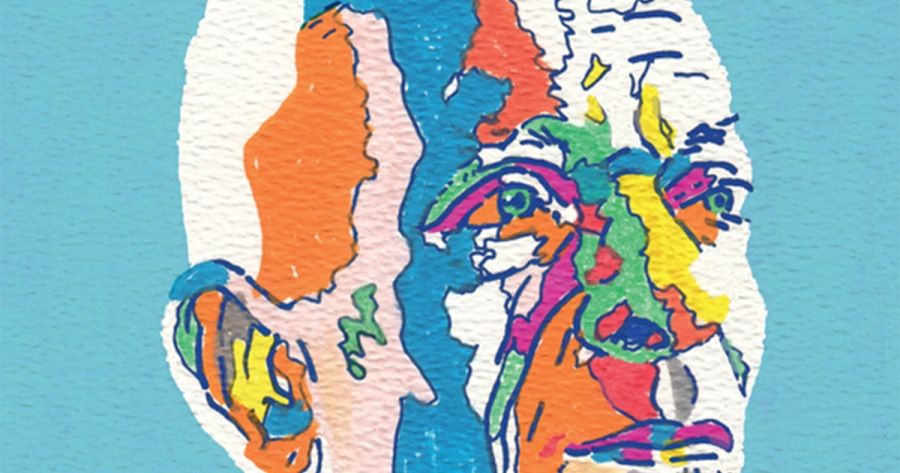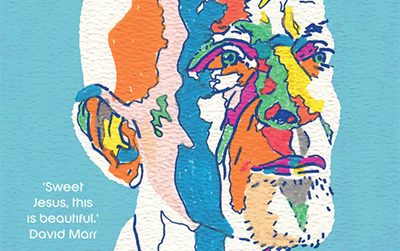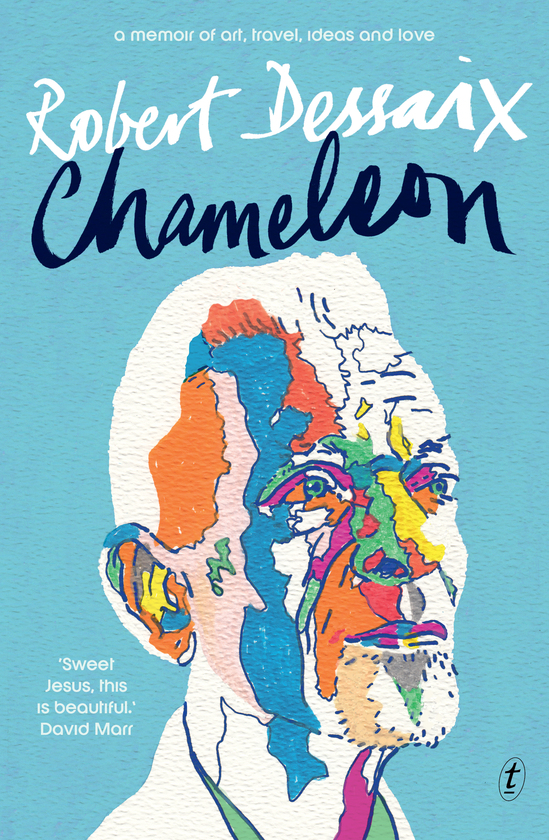
- Free Article: No
- Contents Category: Memoir
- Review Article: Yes
- Article Title: On liking men
- Article Subtitle: The feathery solipsism of Robert Dessaix
- Online Only: No
- Custom Highlight Text:
Erudition for its own sake is perhaps not as prized in the world of Australian letters as it once was; in an age when sparsity is king – where blunt clarity and a kind of punchy journalese dominate contemporary essay writing – loquaciousness and intricate wordplay are undervalued commodities. Feathery intellectualism of the type personified by Robert Dessaix might not be much in vogue, which is precisely why it feels so joyful and necessary. Chameleon, his latest work of memoir, is discursive and prismatic, wise and worldly. For the shambolic musings of an esteemed octogenarian – ‘now at the end of my life, at the fraying, but suddenly illumined, highly coloured end of my life’ – it is expertly calibrated, often remarkably vivid, and always exquisitely articulated.
- Featured Image (400px * 250px):

- Alt Tag (Featured Image): Tim Byrne reviews ‘Chameleon’ by Robert Dessaix
- Book 1 Title: Chameleon
- Book 1 Biblio: Text Publishing, $36.99 pb, 265 pp
- Book 1 Cover Small (400 x 600):

- Book 1 Cover (800 x 1200):

- Book 1 Readings Link: https://www.readings.com.au/product/9781923058279/chameleon--robert-dessaix--2025--9781923058279#rac:jokjjzr6ly9m
Anyone familiar with Dessaix’s oeuvre will know what to expect. From his first work of autobiography, A Mother’s Disgrace (1994), through his novels Night Letters (1996) and Corfu (2001), to the circumlocutory delights of his later works of memoir The Pleasures of Living (2017) and The Time of our Lives (2020), Dessaix has prioritised a certain delicacy of thought, needling and serpentine. What tended towards the prissy and pedantic in his earliest work has matured into something akin to sprezzatura, ‘that particular kind of poise that hides an anxiety’, as he puts it himself. There is a playfulness or gamesmanship about his prose style that reveals rather than obfuscates, his conclusions niggling and antipodal rather than declamatory or aphoristic. He claims that ‘I’ve certainly been to my last masked ball’, that it’s time ‘for at least a bit of plain speaking, don’t you think?’ But he can’t help a lifelong tendency to worm into an idea, even at the risk of hollowing it out.
Dessaix opens with an antithesis he will go on to resolve between Pierrot and Harlequin, the commedia dell’arte figures immortalised in the famous painting by Paul Cézanne (1888-90). He associates the sad clown in white with his former self, ‘a cross-eyed bastard of no consequence’ he refers to throughout as Thomas Robert Jones, the name given to him by his adoptive parents. The ‘whiteness’ of Pierrot represents not just naïveté and childishness but chastity, purity, and a kind of antiseptic virtue, the traits that kept him safe and celibate, a devotee of Julie Andrews rather than Julie Christie. Harlequin represents the eroticised Other, the world of sensuality and sexual exploration he would eventually go on to fully embrace as an openly gay man.
‘Gay’, though, isn’t quite the word. Neither is ‘queer’, for which Dessaix professes a distinct, historical aversion – ‘a term of abuse, a threat, the sort of thing louts might sneer at you before smashing their fist into your face’. There is something a little curmudgeonly and contrarian about his reticence here, a refusal to engage with the intricacies of sexual and gender politics that sits at odds with his otherwise fluid sensibilities. He often argues for an expanded, empathetic definition of masculinity, but then rails against contemporary efforts to do precisely that. He senses a ‘daily litany of socialist pieties’ on the breeze, and claims that his younger self would ‘be astounded how heavily policed our public utterances are today, sixty years later, in the West’. Eventually, he settles on a description of the self he can accept, a ‘man who likes men. That’s it.’
Dessaix has always been a master of travel writing – an antipodean Orhan Pamuk, lushly impressionistic and achingly personal. Here he writes with élan and excoriating wit about Vancouver, ‘a place to change trains in, to join a cruise in, even to live and work in, but not to do things in. You can’t think of a single thing to do after breakfast.’ He speaks of Amsterdam, where his ‘puritanical self-righteousness was dazzled by the contrapuntal babble of it all … the sculpture workshops, the artists’ lofts, the sex shops, cafés, brothels, all side by side – in a word, by the exuberance, the chequered, multicoloured humanness of everything you saw’. He keeps his wick trimmed for Morocco, ‘the ochres and whites, the sandalwood and musk, as well as the cloying stench of ordure. In Morocco, the lights came on.’
This swooning adoration of all things North African aligns him with an orgy of gay writers who flocked there in the early part of the twentieth century for its liberal attitudes to sex, including André Gide, Tennessee Williams, and Paul Bowles – one suspects the literary pedigree played a large part in its appeal for Dessaix, at least initially. His observations flirt with the orientalism and exoticism that Edward Said long criticised, but Dessaix remains bracingly defiant, arguing that ‘I was not looking for the exotic, you must understand … to colonise or rape the Other, but for a wider, more rooted sense of who I was’. There is something marvellously persuasive about his thoughts on the subject, a vision of travel as connective network or matrix, a way of uncovering the self in the beyond.
Chameleon poses as a kind of accidental kaleidoscope of memory, a spilling of notes on a life in the wings of the auditorium. It is, of course, far more deliberate and considered than that, a minutely augmented act of solipsism that nevertheless fringes the universal. Passionate and infectious, it crackles with acuity and well-earned insight, bursting with references from Prokofiev to George Michael, from Konstantin Paustovsky to Ryan Gosling. Throughout, we sense Dessaix over our shoulder with the wink and the nudge, sly and sardonic. It’s a game, but an endlessly entertaining one, like a chess match with one’s wittiest uncle, the one you can’t imagine living without. Towards the end, he talks of T.S. Eliot and Georgia O’Keefe, of trying ‘to crystallise a vision you hadn’t fully understood, Thomas Robert. I’m still trying. I’m still in the dark, and I’m nearly dead, but I’m still trying.’


Comments powered by CComment